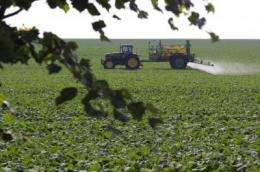Pesticides -- easier detection of pollution and impact in rivers

The long-term effects of pesticides on living organisms in rivers and on water quality can now be assessed more easily. Researchers from the Helmholtz Centre for Environmental Research (UFZ) have developed a tool that can estimate the harmful effect of pesticides, such as those flushed into rivers and streams from agricultural land, within minutes.
"It used to be very difficult to detect which chronic effects occur," explains Dr Matthias Liess, head of the UFZ's System Ecotoxicology Department. In their new approach, the Helmholtz researchers exploit the fact that pesticides cause characteristic changes to the composition of the life community that is affected.
"You just need to find out which living creatures, e.g. insects and crabs, are found at a certain point along the river and in what numbers," Liess explains. The authorities responsible for water management usually have such data available, he adds. Liess and his colleagues have now set up a Web application where this data can be entered and evaluated to show immediately how high the level of pollution in the rivers under investigation actually is. Users download an Excel table from the http://www.systemecology.eu/SPEAR/Start.html website and then enter the numbers of each kind of organism found at each sampling site. Once the table is complete it is fed into the 'SPEAR calculator' and the user enters the region in which the samples were taken. The calculator immediately shows what the water quality in the area in question is like. Regional data is currently available for Germany, France, Finland and Western Siberia, but the system has also been tested in the UK and in Australia. There is no charge for using the service.
Liess believes the authorities can use the calculation results to take suitable steps to reduce pesticide pollution of rivers. "But our tool can do more than just identify problem areas," the Helmholtz scientist stresses. It also indicates where unpolluted stretches of river are compensating for the effect of the pollution. This is extremely important because it can show when conservation methods have been successful. Another advantage of the new tool is that in many cases, complex, expensive chemical analyses will no longer be necessary.
Source: Helmholtz Association of German Research Centres (news : web)
















